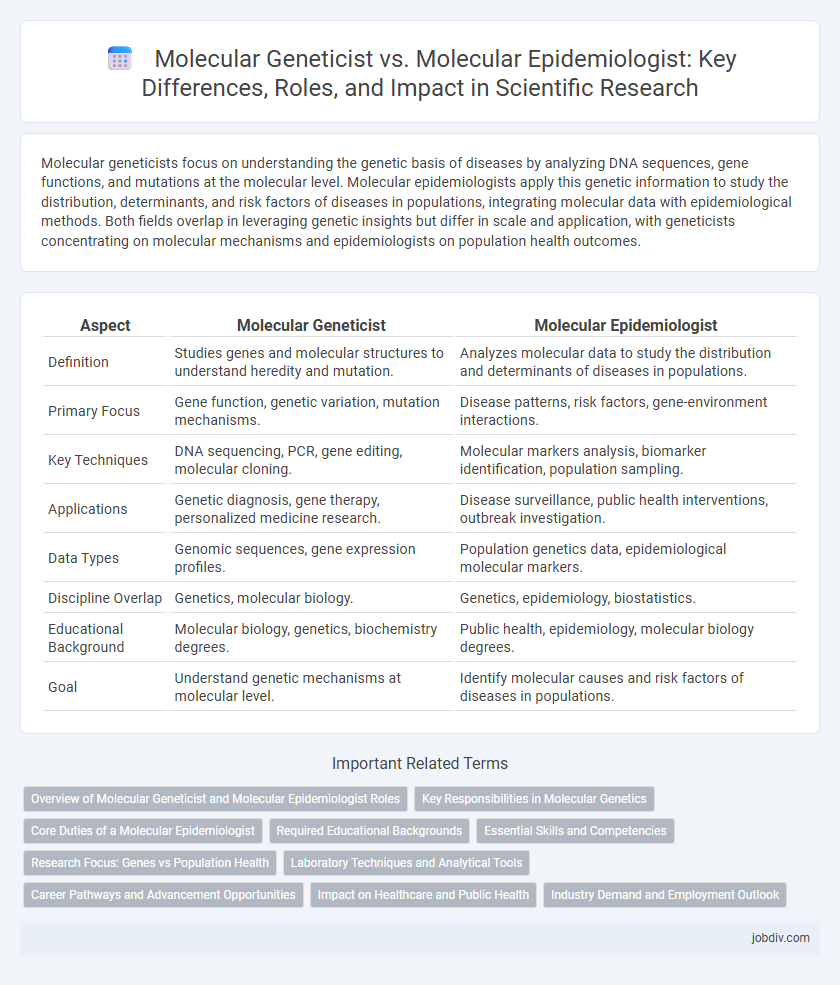Molecular geneticists focus on understanding the genetic basis of diseases by analyzing DNA sequences, gene functions, and mutations at the molecular level. Molecular epidemiologists apply this genetic information to study the distribution, determinants, and risk factors of diseases in populations, integrating molecular data with epidemiological methods. Both fields overlap in leveraging genetic insights but differ in scale and application, with geneticists concentrating on molecular mechanisms and epidemiologists on population health outcomes.
Table of Comparison
| Aspect | Molecular Geneticist | Molecular Epidemiologist |
|---|---|---|
| Definition | Studies genes and molecular structures to understand heredity and mutation. | Analyzes molecular data to study the distribution and determinants of diseases in populations. |
| Primary Focus | Gene function, genetic variation, mutation mechanisms. | Disease patterns, risk factors, gene-environment interactions. |
| Key Techniques | DNA sequencing, PCR, gene editing, molecular cloning. | Molecular markers analysis, biomarker identification, population sampling. |
| Applications | Genetic diagnosis, gene therapy, personalized medicine research. | Disease surveillance, public health interventions, outbreak investigation. |
| Data Types | Genomic sequences, gene expression profiles. | Population genetics data, epidemiological molecular markers. |
| Discipline Overlap | Genetics, molecular biology. | Genetics, epidemiology, biostatistics. |
| Educational Background | Molecular biology, genetics, biochemistry degrees. | Public health, epidemiology, molecular biology degrees. |
| Goal | Understand genetic mechanisms at molecular level. | Identify molecular causes and risk factors of diseases in populations. |
Overview of Molecular Geneticist and Molecular Epidemiologist Roles
Molecular geneticists analyze DNA sequences and genetic variations to understand hereditary diseases and gene functions at a cellular level, employing techniques such as gene mapping and sequencing. Molecular epidemiologists study the distribution and determinants of genetic and environmental factors in populations to identify risk factors for diseases, integrating molecular biology with epidemiologic methods. Both roles require expertise in molecular biology but differ in focus: molecular geneticists concentrate on genetic mechanisms, while molecular epidemiologists emphasize population-level disease patterns and prevention strategies.
Key Responsibilities in Molecular Genetics
Molecular Geneticists focus on analyzing DNA, RNA, and proteins to understand genetic mutations and gene functions related to diseases. They conduct laboratory experiments, perform genetic sequencing, and interpret molecular data to identify hereditary conditions and develop targeted therapies. Their work often involves using bioinformatics tools to analyze genetic variations and their impact on cellular processes.
Core Duties of a Molecular Epidemiologist
A molecular epidemiologist specializes in studying genetic and environmental risk factors influencing disease patterns within populations by analyzing molecular and genetic data. Core duties involve designing and conducting population-based studies, collecting and interpreting biological samples, and utilizing statistical methods to identify molecular biomarkers linked to disease susceptibility and progression. This role integrates molecular biology with epidemiology to develop strategies for disease prevention and public health intervention.
Required Educational Backgrounds
Molecular geneticists typically require a Ph.D. in molecular biology, genetics, or a closely related field, emphasizing extensive laboratory research and advanced coursework in gene expression, DNA sequencing, and bioinformatics. Molecular epidemiologists often hold a master's or doctoral degree in epidemiology, public health, or molecular biology, integrating training in population health, biostatistics, and molecular techniques to study disease patterns. Both disciplines demand strong foundations in molecular biology, but molecular epidemiologists prioritize statistical analysis and population-based study methods.
Essential Skills and Competencies
Molecular Geneticists require advanced expertise in DNA sequencing, gene expression analysis, and bioinformatics to identify genetic mutations and understand hereditary conditions. Molecular Epidemiologists must excel in statistical modeling, population genetics, and data interpretation to investigate the distribution and determinants of diseases within populations. Both professions demand strong analytical skills, proficiency in laboratory techniques, and the ability to integrate molecular data with clinical or environmental factors for comprehensive research outcomes.
Research Focus: Genes vs Population Health
Molecular geneticists specialize in analyzing individual genes and molecular mechanisms to understand hereditary diseases and genetic variations. Molecular epidemiologists investigate patterns, causes, and effects of health and disease conditions in populations by integrating genetic data with environmental and lifestyle factors. This distinction highlights the molecular geneticist's focus on cellular-level genetics versus the molecular epidemiologist's emphasis on genetic influences within broader population health contexts.
Laboratory Techniques and Analytical Tools
Molecular geneticists specialize in laboratory techniques such as PCR, gel electrophoresis, and DNA sequencing to analyze genetic material at a molecular level. Molecular epidemiologists employ advanced analytical tools like bioinformatics software, statistical modeling, and high-throughput genotyping to study genetic variations within populations and their association with disease patterns. Both fields utilize CRISPR technology and next-generation sequencing, but molecular epidemiologists emphasize population-based data analysis while molecular geneticists focus on gene function and mutation characterization.
Career Pathways and Advancement Opportunities
Molecular geneticists typically pursue advanced degrees in genetics or molecular biology, focusing on laboratory research and genetic analysis, with career advancement often involving specialization in gene editing or clinical genetics. Molecular epidemiologists combine molecular biology with public health, requiring expertise in biostatistics and population health, leading to roles in disease surveillance or epidemiologic research. Both fields offer pathways to leadership positions in academia, government agencies, or biotech industries, with advancement hinging on research contributions and interdisciplinary collaboration.
Impact on Healthcare and Public Health
Molecular geneticists advance healthcare by identifying genetic mutations linked to diseases, enabling personalized treatment and precision medicine. Molecular epidemiologists analyze genetic and environmental factors influencing disease patterns, guiding public health interventions and outbreak prevention. Together, their insights improve disease diagnosis, patient care, and population-level health strategies.
Industry Demand and Employment Outlook
Molecular geneticists are in high demand within biotechnology, pharmaceuticals, and clinical diagnostics industries due to their expertise in gene sequencing and genetic mutation analysis, driving innovations in personalized medicine. Molecular epidemiologists are increasingly sought after in public health agencies and research institutions to track disease patterns and understand genetic factors in population health, enhancing outbreak prediction and prevention strategies. Employment outlook for both fields shows strong growth, with molecular geneticists benefiting from advancements in gene editing technologies, while molecular epidemiologists gain prominence amid global health challenges and the rise of precision epidemiology.
Molecular Geneticist vs Molecular Epidemiologist Infographic

 jobdiv.com
jobdiv.com